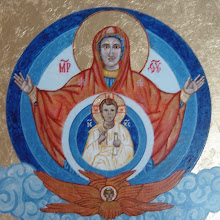
Bohemian Master of Prague, 1482,
St. Agnes Caring for the Sick
Agnes was born in 1205 to King Ottakar I and Queen Constance of Bohemia. At the age of three, she was betrothed to Prince Boleslaus, who died before they were married. At his death, she decided that she wanted to pursue a religious life, but her parents objected, and she was betrothed to several other men, including the Holy Roman Emperor, Fredrick II. Desiring to live her life as she felt called to live it, she asked Pope Gregory IX to intervene on her behalf, and to ask Frederick to release her from the promise to marry. Frederick was insulted by the request, but freed her from her obligation. "if she had rejected me for another man" said Frederick, "I would have made my vengeance felt, but I cannot take offence if she prefers the King of Heaven to myself".
Her father had died in 1220, and left her quite a bit of wealth. In imitation of her cousin, St. Elizabeth of Hungary, Agnes used her wealth to build a hospital in Prague,in honor of St. Francis. She also built a convent for the Poor Ladies and asked the Pope to send a group to Prague. She was hoping a group would come from San Damiano, but instead, five sisters were sent from Trent. Agnes entered the convent on Pentecost Sunday, 1234. In August, the Pope directed that Agnes be made the Abbess of the convent. She declined, but he ordered her to accept.
She and St. Clare never met, but they corresponded with each other for at least twenty years. Only four of Clare's letters to Agnes survive, but the letters show that these two women shared common desires and common struggles. Both desired to live lives of poverty, prayer, and service, and both desired to have the wishes they had for their own lives blessed by the Church. Yet, they continually struggled with the Church, and with a Pope who sometimes did not share their vision. Finally, the Pope did relent and allow her the "Privilege of Poverty", that she desired, but he never allowed her to form her community after the manner of Clare and the convent in San Damiano. He insisted her community follow his own Rule, which was based on the Rule of St. Benedict. However, she did never gave up. And in 1250, Pope Innocent IV allowed the Poor Clares in Prague to follow the Rule of St. Francis.
There were heavy snows in the winter of 1281, which brought famine. Agnes did without food so that others would have food to eat. She soon became weak and to the point of death. Her Legend tells the story of her death:
"On the third Sunday of Lent, sensing the approach of her happy departure from earth, she confided to a few of those most dear to her that the hour of death had come. With profound devotion she assured the safety of her journey by receiving the holy Eucharist and Anointing, in the presence of the friars and sisters... The following day, she was radiant with joy, a smile always on her face. As Mass was about to be celebrated at the ninth hour, she entrusted her soul into the hands of the heavenly Father. On the 2nd March 1281 she fell asleep serenely in the Lord, and was accompanied by an escort of angels to enter jubilantly into eternal joy."
Many miracles were wrought by intercessions to Agnes, both during her lifetime, and after her death, yet she was not beatified until 1874, and her canonization was not until 1989. Her holiness was renowned, as St. Clare herself acknowledged in her first letter to Agnes:
As I hear of the fame of Your holy conduct and irreproachable life, which is known not only to me but to the entire world as well, I greatly rejoice and exult in the Lord. I am not alone in rejoicing at such great news, but [I am joined by] all who serve and seek to serve Jesus Christ. For, though You, more than others, could have enjoyed the magnificence and honor and dignity of the world, and could have been married to the illustrious Caesar with splendor befitting You and His Excellency, You have rejected all these things and have chosen with Your whole heart and soul a life of holy poverty and destitution. Thus You took a spouse of a more noble lineage, Who will keep Your virginity ever unspotted and unsullied, the Lord Jesus Christ:
When You have loved [Him], You shall be chaste;
when You have touched [Him], You shall become pure;
when You have accepted [Him], You shall be a virgin.
Whose power is stronger,
Whose generosity is more abundant,
Whose appearance more beautiful,
Whose love more tender,
Whose courtesy more gracious.
In Whose embrace You are already caught up;
Who has adorned Your breast with precious stones
And has placed priceless pearls in Your ears
and has surrounded You with sparkling gems
as though blossoms of springtime
and placed on Your head a golden crown
as a sign [to all] of Your holiness.

St. Clare and St. Agnes, painted by Sister Roberta Cusack, OSF








